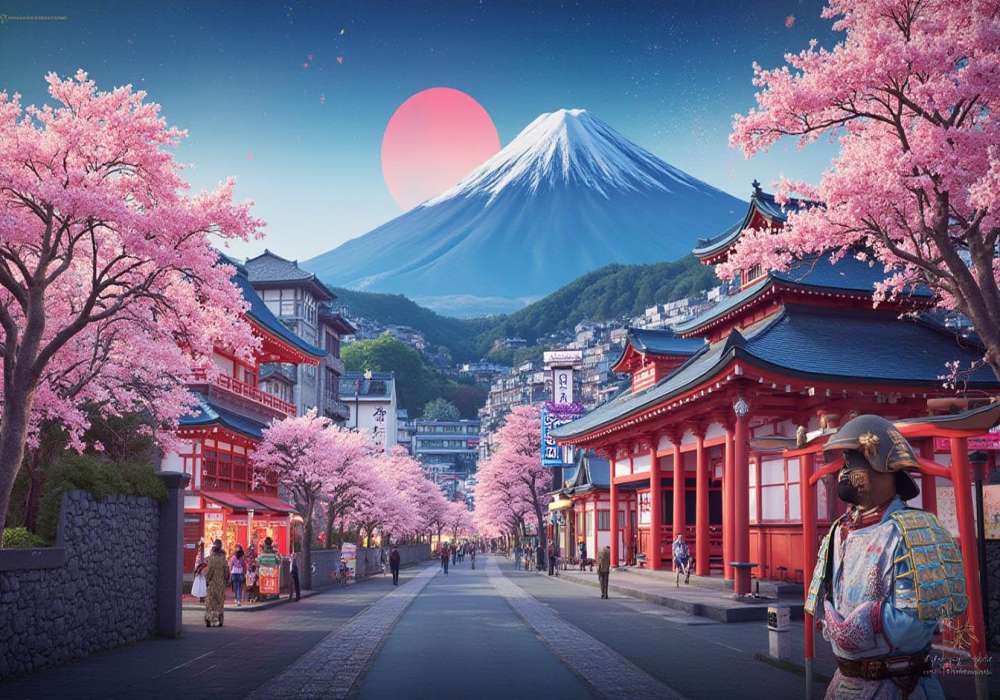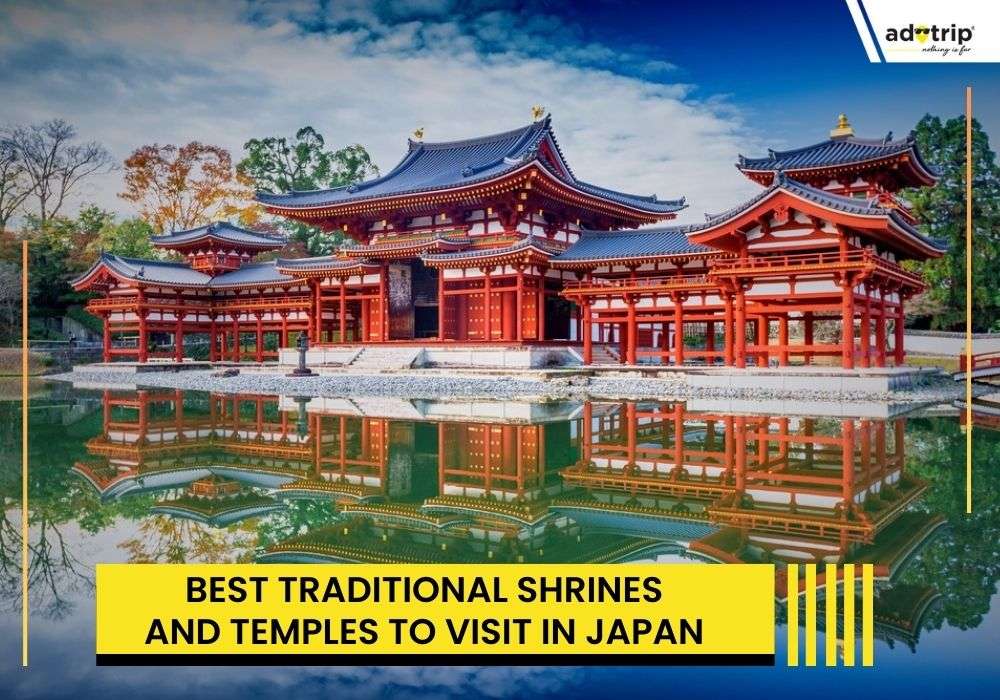
Last Updated At: 01-Sep-2025
15 Interesting Facts About The Japan | Culture, Cuisine and History
Japan is a fascinating island nation in East Asia, blending modern technology with age-old customs. It has a wealth of cultural treasures like elaborate tea rituals, chic kimonos, and tranquil Zen gardens. Japan’s history spans millennia. But it's also a centre of technological innovation on a global scale, helping to create innovations in machines, electronics, and transportation. Famous sites like the imposing Mount Fuji and the thriving metropolis of Tokyo provide an insight into the country's contrasting identities. With its distinctive fusion of tradition and innovation, Japan continues to enchant the world with everything from sushi delicacies to bullet trains.
List Of 15 Mind-Blowing Facts About Japan
Here are the top 15 facts about Japan you probably didn't know, including anything from the fashion in Harajuku, empty orchestras, and dining manners. While keeping yourself updated about this beautiful country, do not forget to check out some of the top tourist attractions in Japan.
Read More: Cherry Blossom Festival in Japan
1.Japan is home to the world's oldest company
Nishiyama Onsen Keiunkan, the oldest continually running business in the world, is located in Japan. The inn dates back to 705 AD and has been owned and run by the same family for over 50 generations. A memorial to Japan's rich cultural legacy and persistent business practices, this Yamanashi Prefecture establishment has preserved its traditional hospitality for decades.
2. The population of Japan is the 11th-largest in the world
The population of Japan is the eleventh-largest in the world. The nation has a diversified civilisation due to its advanced technologies and rich Japanese cultural heritage. Japan provides a distinctive fusion of tradition and modernity in its vibrant metropolis and tranquil countryside. Its demographic trends, including an ageing population and low birth rates, could be improved for the country's long-term economic viability.
3. Japanese people live the longest lives
The Japanese population's life expectancy is among the world's highest. Their balanced lifestyle and diet, emphasising fresh fish and vegetables, help them live long lives. Their well-being is further improved by access to high-quality healthcare and strong community support. The exceptional lifespan statistics of Japan are greatly influenced by the nation's cultural customs and healthcare system.
4. There is one vending machine for every 24 people in Japan
The astounding prevalence of vending machines in Japan reveals the country's obsession with them. These machines dispense a variety of goods, from drinks and snacks to even more oddball items like fresh eggs and apparel, with one vending machine per every 24 people. This convenience-driven phenomenon exemplifies the country's creative spirit and how seamlessly technology is incorporated into daily life.
5. Japan produces almost half of the world's zippers
Zippers are not exempted from Japan's influence in the fashion and manufacturing sectors. The nation makes over half of the zippers in the world, demonstrating its meticulous engineering. Japanese zippers are admired by fashion designers and manufacturers worldwide for their high quality and dependability, further proving Japan is a pioneer in production and craftsmanship.
Read More: Best Beaches in Japan
6. You can spend more than $200 on a Japanese melon
With its abundant fruit, Japanese agriculture reaches new heights, as demonstrated by the premium melons that can fetch prices of more than $200. These expensive fruits, often given as gifts, are methodically grown for their ideal flavour, form, and texture. These lavish, highly valued treats result from the cultural significance of gift-giving and the objective of agricultural excellence.
7. Over 80% of Jamaica's annual coffee crop is imported by Japan
Japan imports over 80% of Jamaica's yearly coffee production and is a significant market for the nation's renowned coffee sector. The limited supply and distinctive flavour characteristics of Jamaica's premium Blue Mountain coffee are reflected in its demand. Japanese customers ' excitement for good coffee drives the crucial dealing relationship, strengthening both countries' economic links and cultural exchanges.
8. The largest fish market in the world used to be in Japan
The Tsukiji Market, the biggest fish market in the world, has evolved into one of Tokyo's most unique and authentic tourist destinations. This market was important to developing the nation's culinary tradition because of its lively ambience and variety of seafood selections. However, over time, adjustments in market dynamics and the global fishing industry have caused changes in the relative importance of major fish markets worldwide.
9. There is a meat dish made of horses in Japanese cuisine
Basashi, a meat dish from horses, is a staple of Japanese cuisine. It is frequently served raw or thinly sliced and is renowned for its delicate flavour and sensitive texture. Wasabi, garlic, and soy sauce are often used to pair with basashi. Even though it is less typical than other foods, it is a distinctive culinary experience that showcases the variety of tastes in Japanese food.
10. In Japanese culture, removing your shoes is considered respectful
In Japanese culture, removing shoes is a traditional expression of respect. By representing leaving dirt and negativity at the door, it encourages cleanliness and harmony in residences and other locations. This gesture promotes consideration and mindfulness whether one is visiting someone's home or entering traditional buildings, including ryokans and temples. It also shows courtesy and commitment to cultural standards.
11. Men were the first geisha in Japan
In contrast to the common belief of a feminine geisha, this cultural phenomenon has masculine origins. Male geisha, also known as "hkan," entertained patrons in the 18th century with song, dance, and wit. The male geisha tradition decreased as time went on as the female counterpart rose to prominence. However, their historical importance highlights Japan's entertainment culture always changes.
12. It's acceptable to slurp your noodles in Japan
Ramen or udon noodles can be slurped in Japan, where it's accepted and encouraged. This behaviour expresses thanks and delights for the food. The noodles taste better and cool down when you slurp them. This custom illustrates the importance of the Japanese enjoying their meals and expressing their delight in public.
13. In Japan, dining alone is common
Dining alone is now a typical occurrence in Japan. Numerous causes, including urbanisation, changed work schedules, and increased one-person homes, can be linked to this cultural transition. Many eateries offer counter seating to suit lone diners as the idea of "honbetsu", or eating alone, is accepted without stigma. This tendency exemplifies how social relations are changing in Japanese society, where personal time and convenience have become more valued in the fast-paced modern way of life.
14. Mountains cover more than 80% of Japan's geography
Over 80% of Japan's land is covered in mountains, which gives the country its distinctive appearance. These stunning mountains, especially well-known ones like Mount Fuji, have a major impact on Japan's culture, history, and way of life. The mountains have influenced settlement patterns since valleys and coastal plains are the key places for cities and towns. In this heavily populated country, efficient land management is essential due to the difficult terrain's effects on transportation and agriculture.
15. Japan experiences about 1500 earthquakes per year
Due to its tectonic activity, Japan, located on the Pacific Ring of Fire, has over 1500 earthquakes yearly. This area's seismic activity is caused by many tectonic plates colliding within it. Although most earthquakes are small and unseen, the nation has significantly invested in modern earthquake preparedness methods, creating resilient infrastructure to limit possible damages.
If you want a hassle-free and delightful trip, Adotrip is a great choice for a travel companion while planning a tour to Japan. Adotrip can help you have a better trip by providing comprehensive travel guides, expertly crafted itineraries and local knowledge. Find some unusual facts about Japan. Use expert Japan’s travel tips for a memorable trip to the country.
With us, nothing is far!
Frequently Asked Questions About Facts About Japan
Q1. What are some traditional cultural practices in Japan?
A1. Tea ceremonies (chanoyu), flower arrangements (ikebana), donning kimonos, and holidays like Hanami (cherry blossom viewing) are all traditional cultural activities in Japan that represent the country's rich history.
Q2. How has Japan contributed to advancements in technology?
A2. Through inventions in consumer electronics (Sony, Nintendo), robotics (Honda's ASIMO), and manufacturing procedures (Lean principles), Japan has greatly advanced technology, impacting international industries and reshaping modern technical advancement.
Q3. What are some must-visit destinations for tourists in Japan?
A3. For an unforgettable Japanese experience, visitors must see Tokyo's bustling urban life, Kyoto's ancient temples, Hiroshima's Peace Memorial Park, Mount Fuji's breathtaking splendour, and Kanazawa's cultural allure.
Q4. What are some popular Japanese dishes and culinary delights?
A4. Popular foods from Japanese cuisine include sushi, sashimi, ramen, tempura, and yakitori. Mochi, sweets with matcha flavours, and traditional treats like wagashi are all cherished delicacies that showcase the variety of Japanese cuisine.
Q5. What is the significance of cherry blossoms in Japanese culture?
A5. Sakura, or cherry blossoms, are deeply rooted in Japanese culture as a representation of impermanence and the beauty of life's transient nature. Hanami, the practice of seeing these blooms, promotes harmony and contemplation.
Q6. How is the Japanese education system structured?
A6. Vocational education aims to keep pupils on a level with international norms. In Japan, there are five levels of education: preschool, primary, lower secondary, and higher secondary, in addition to college and university. Passing entrance tests is a requirement for enrollment at all educational levels.
Q7. What are some famous Japanese historical figures and events?
A7. Among the well-known historical characters of Japan are Tokugawa Ieyasu, Oda Nobunaga, and Emperor Hirohito. The Meiji Restoration, the Battle of Sekigahara, and the World War II bombing of Hiroshima are noteworthy events.
Q8. How does the concept of "Omotenashi" influence Japanese hospitality?
A8. "Omotenashi" exemplifies Japanese hospitality by prioritising guests' requirements, identifying their needs, and offering top-notch service. It highlights reverence, focus on detail, and an honest desire to offer an unforgettable experience.
Q9. What are some unique customs and etiquette in Japan?
A9. Japanese customs include removing shoes indoors, bowing as a welcome, and slurping noodles. When exchanging products, one should use both hands and refrain from blowing one's nose in public.
Q10. How does Japan blend modernity with its rich traditional heritage?
A10. Through modern technology, architecture, and fashion, and preserving cultural rituals like tea ceremonies, Japanese festivals, and love for the environment, Japan smoothly combines modernity with tradition, fostering peaceful coexistence.
--- Published By Adotrip
Latest Blogs

Cash in the Wild: My Safari Adventure Across Kenya with Only...

One Day Picnic Spot Near Pune - Adventure, Trekking and Natu...

One Day Picnic Spots Near Mumbai - Monsoon, Adventure, Beach...

The Best Places to Go in Thailand in 2025








.jpg)
.jpg)


 Dubai
Dubai Malaysia
Malaysia USA
USA





